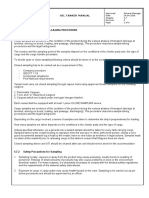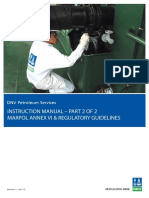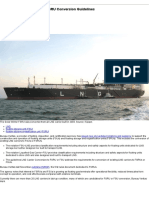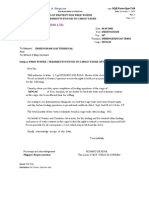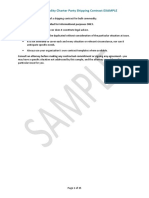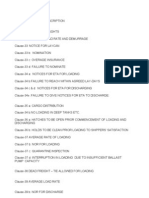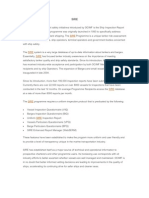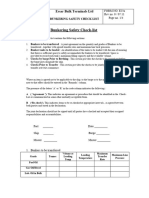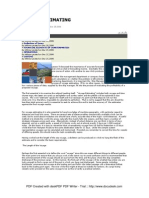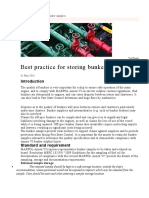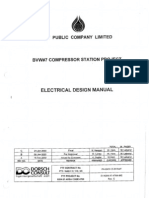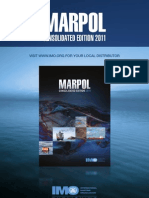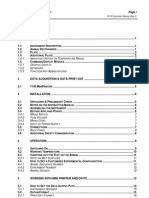Bunkers Sampling Guidelines
Bunkers Sampling Guidelines
Uploaded by
gamronCopyright
Available Formats
Share this document
Did you find this document useful?
Is this content inappropriate?
Report this DocumentCopyright:
Available Formats
Bunkers Sampling Guidelines
Bunkers Sampling Guidelines
Uploaded by
gamronCopyright:
Available Formats
1 PREFACE The primary objective of these Guidelines is to establish an agreed method to obtain a representative sample of the fuel oil
for combustion purposes delivered for use on board ships. 2 INTRODUCTION The basis for these Guidelines is regulation 18(3) of Annex VI to MARPOL 73/78, which provides that for each ship subject to regulations 5 and 6 of that Annex, details of fuel oil for combustion purposes delivered to, and used on board the ship, shall be recorded by means of a bunker delivery note which shall contain at least the information specified in appendix V to that Annex. In accordance with regulation 18(6) of Annex VI, the bunker delivery note shall be accompanied by a representative sample of the fuel oil delivered. This sample is to be used solely for determination of compliance with Annex VI of MARPOL 73/78. 3 DEFINITIONS For the purpose of these Guidelines: 3.1 Suppliers representative* is the individual from the bunker tanker who is responsible for the delivery and documentation or, in the case of deliveries direct from the shore to ship, the person who is responsible for the delivery and documentation. 3.2 Ships representative is the ships master or officer in charge who is responsible for receiving bunkers and documentation.
* For the purposes of Australian implementing legislation, this is the local fuel oil suppliers representative.
3.3 Representative sample is a product specimen having its physical and chemical characteristics identical to the average characteristics of the total volume being sampled. 3.4 Primary sample is the representative sample of the fuel delivered to the ship collected throughout the bunkering period obtained by the sampling equipment positioned at the bunker manifold of the receiving ship. 3.5 Retained sample is the representative in accordance with regulation 18(6) of Annex VI to MARPOL 73/78, of the fuel delivered to the ship derived from the primary sample. 4 SAMPLING METHODS 4.1 The primary sample should be obtained by one of the following methods: 1. manual valve-setting continuous-drip sampler; or 2. time-proportional automatic sampler; or 3. flow-proportional automatic sampler. 4.2 Sampling equipment should be used in accordance with the manufacturers instructions, or guidelines, as appropriate. 5 SAMPLING AND SAMPLE INTEGRITY 5.1 A means should be provided to seal the sampling equipment throughout the period of supply.
5.2 Attention should be given to: 1. the form of set up of the sampler; 2. the form of the primary sample container; 3. the cleanliness and dryness of the sampler and the primary sample container prior to use; 4. the setting of the means used to control the flow to the primary sample container; and 5. the method to be used to secure the sample from tampering or contamination during the bunker operation. 5.3 The primary sample receiving container should be attached to the sampling equipment and sealed so as to prevent tampering or contamination of the sample throughout the bunker delivery period. 6 SAMPLING LOCATION For the purpose of these Guidelines a sample of the fuel delivered to the ship should be obtained at the receiving ships inlet bunker manifold and should be drawn continuously throughout the bunker delivery period.*
*The phrase be drawn continuously throughout the bunker delivery period in paragraph 6 of the Guidelines should be taken to mean continuous collection of drip sample throughout the delivery of bunker fuel covering each bunker delivery note. In case of receiving an amount of bunker fuel necessitating two or more delivery notes, the sampling work may be temporarily stopped to change sample bags and bottles and then resumed as necessary.
7 RETAINED SAMPLE HANDLING 7.1 The retained sample container should be clean and dry. 7.2 Immediately prior to filling the retained sample container, the primary sample quantity should be thoroughly agitated to ensure that it is homogeneous. 7.3 The retained sample should be of sufficient quantity to perform the tests required but should not be less than 400 ml. The container should be filled to 90% 5% capacity and sealed. 8 SEALING THE RETAINED SAMPLE 8.1 Immediately following collection of the retained sample, a tamper proof security seal with a unique means of identification should be installed by the suppliers representative in the presence of the ships representative. A label containing the following information should be secured to the retained sample container: .1 location at which, and the method by which, the sample was drawn; .2 date of commencement of delivery; .3 name of bunker tanker/bunker installation; .4 name and IMO number of the receiving ship; .5 signatures and names of the suppliers representative and the ships representative; .6 details of seal identification; and .7 bunker grade. 8.2 To facilitate cross-reference details of the seal, identification may also be recorded on the bunker delivery note.
9 RETAINED SAMPLE STORAGE 9.1 The retained sample should be kept in a safe storage location, outside the ships accommodation, where personnel would not be exposed to vapours which may be released from the sample. Care should be exercised when entering a sample storage location. The retained sample should be stored in a sheltered location where it will not be subject to elevated temperatures, preferably at a cool/ambient temperature, and where it will not be exposed to direct sunlight. Pursuant to regulation 18(6) of Annex VI of MARPOL 73/78, the retained sample should be retained under the ships control until the fuel oil is substantially consumed, but in any case for a period of not less than 12 months from the time of delivery. The ships master should develop and maintain a system to keep track of the retained samples.
9.2
9.3
9.4
BUNKERS SAMPLING GUIDELINES
Guidelines for the sampling of fuel oil for determination of compliance wtih Annex VI of MARPOL 73/78, in accordance with IMO Resolution MEPC.96(47)
AMSA 223 (6/07)
You might also like
- GR 5 Myview Int'l Curriculum MapDocument74 pagesGR 5 Myview Int'l Curriculum MapV.100% (1)
- Velavoy2005p1 UnprotectedDocument3 pagesVelavoy2005p1 UnprotectedСимеон АйковNo ratings yet
- Container Ship PlanDocument1 pageContainer Ship PlangamronNo ratings yet
- Container Ship PlanDocument1 pageContainer Ship PlangamronNo ratings yet
- Container Ship PlanDocument1 pageContainer Ship PlangamronNo ratings yet
- 6th Central Pay Commission Salary CalculatorDocument15 pages6th Central Pay Commission Salary Calculatorrakhonde100% (436)
- 4.7 Cargo Sampling and Ullaging Procedure OkDocument6 pages4.7 Cargo Sampling and Ullaging Procedure OkchNo ratings yet
- Rut CourseDocument97 pagesRut CourseSajeev NerurkarNo ratings yet
- ANEC 41 - SoybeansDocument5 pagesANEC 41 - Soybeansstevenverbeek100% (1)
- 50m AHTS GA PDFDocument1 page50m AHTS GA PDFgamron0% (1)
- 26m TugDocument5 pages26m Tuggamron100% (1)
- CBC Animal Health Care & Management NC IIIDocument66 pagesCBC Animal Health Care & Management NC IIIMaria Angellie S. Bellido - EramisNo ratings yet
- Normal Distribution Slides Questions Solutions: Example 1Document3 pagesNormal Distribution Slides Questions Solutions: Example 1Dipak Kumar PatelNo ratings yet
- DNVPS Fuel Testing Procedures Part 2Document18 pagesDNVPS Fuel Testing Procedures Part 2Kai100% (1)
- UK P I Bunkers and BunkeringDocument48 pagesUK P I Bunkers and BunkeringGeorgios Papakostas100% (1)
- Bills of Lading The Early DepartureDocument4 pagesBills of Lading The Early DepartureDmitryNo ratings yet
- ZZ 1207573397 IsoFraction LNG Sampling SystemR2Document3 pagesZZ 1207573397 IsoFraction LNG Sampling SystemR2kaysb786133No ratings yet
- FosfaDocument4 pagesFosfaVan VardasNo ratings yet
- Bunker Problems - Practical and Legal IssuesDocument32 pagesBunker Problems - Practical and Legal Issuesdassi99No ratings yet
- Exxonvoy 84Document8 pagesExxonvoy 84Kaptan LeventcumNo ratings yet
- As 2809.5-2001 Road Tank Vehicles For Dangerous Goods Tankers For Bitumen-Based ProductsDocument7 pagesAs 2809.5-2001 Road Tank Vehicles For Dangerous Goods Tankers For Bitumen-Based ProductsSAI Global - APACNo ratings yet
- Bureau Veritas Issues FSU, FSRU Conversion GuidelinesDocument1 pageBureau Veritas Issues FSU, FSRU Conversion GuidelinesamirlngNo ratings yet
- GUNVOR Independent Inspection Requirements Rev - 6Document34 pagesGUNVOR Independent Inspection Requirements Rev - 6Bhagoo HatheyNo ratings yet
- Common STS ClausesDocument5 pagesCommon STS ClausesSpiropoulos KostasNo ratings yet
- Sample Copy BIMCO Bunker Terms 2018 v3Document15 pagesSample Copy BIMCO Bunker Terms 2018 v3hatice AKPINARNo ratings yet
- LPG Cargo Measurement and Calculation ProcedureDocument4 pagesLPG Cargo Measurement and Calculation ProcedureSatya Prakash BhardwajNo ratings yet
- Lop Free WaterDocument2 pagesLop Free WaterVicentiu Alexandru Grama100% (2)
- Petroleum Calculation Series - Shipboard - Marine and Cargo SurveyorsDocument4 pagesPetroleum Calculation Series - Shipboard - Marine and Cargo Surveyorsselvam00100% (1)
- Bulk Commodity Charter Party Shipping Contract EXAMPLE: This Sample Contract Is Provided For Informational Purposes ONLYDocument15 pagesBulk Commodity Charter Party Shipping Contract EXAMPLE: This Sample Contract Is Provided For Informational Purposes ONLYbetterthandrugsNo ratings yet
- 8 SE ExemptionDocument5 pages8 SE ExemptionLuu Quang HoaNo ratings yet
- Amspec Techtalk A Stands For API Gravity 4Document5 pagesAmspec Techtalk A Stands For API Gravity 4Sudea CadabaNo ratings yet
- Petroleum Calculation SeriesDocument7 pagesPetroleum Calculation SeriesAnonymous UCveMQNo ratings yet
- Dra Aft Surve Ey: Proc Cedures and Cal Lculation N: Readi Ing The Draf Ftmark of TH He ShipDocument4 pagesDra Aft Surve Ey: Proc Cedures and Cal Lculation N: Readi Ing The Draf Ftmark of TH He ShiprubinoestelaNo ratings yet
- Additional Clauses To Pakistani Coal Charter PartyDocument21 pagesAdditional Clauses To Pakistani Coal Charter PartyVinod GuptaNo ratings yet
- We're Going Global: The Impact of Product TemperatureDocument6 pagesWe're Going Global: The Impact of Product TemperaturebabushleshaNo ratings yet
- SireDocument3 pagesSireAmit MishraNo ratings yet
- Survey Planning Questionnaire For Oil Tanker - CASDocument4 pagesSurvey Planning Questionnaire For Oil Tanker - CASrays100% (1)
- ASBATANKDocument6 pagesASBATANKNikos RecantzisNo ratings yet
- LNG 6 - Safeguard Systems 7.3.09-Aacomments-Aug09Document8 pagesLNG 6 - Safeguard Systems 7.3.09-Aacomments-Aug09amirlngNo ratings yet
- 5 SRDocument6 pages5 SRLuu Quang HoaNo ratings yet
- Q&A Ballast Water Management Convention (BWMC) 2004Document6 pagesQ&A Ballast Water Management Convention (BWMC) 2004Nidal AlsheikhNo ratings yet
- Platform Supply Vessel - Analisis de La DemandaDocument9 pagesPlatform Supply Vessel - Analisis de La DemandaSullivan F'gNo ratings yet
- Change of Cargo Grades or Preparation For DrydockDocument3 pagesChange of Cargo Grades or Preparation For DrydockAlice Mano JiamaNo ratings yet
- Doc-18 Letter of AuthorizarionDocument1 pageDoc-18 Letter of AuthorizarionopytnymoryakNo ratings yet
- Carring Fishmeal CargoDocument5 pagesCarring Fishmeal CargoAndrija BoskovicNo ratings yet
- Acceptance Letter - CMA CGMDocument1 pageAcceptance Letter - CMA CGMeddy atencio100% (1)
- E23a ISGOTT Bunker ChklistDocument4 pagesE23a ISGOTT Bunker Chklistvic.barca2012100% (1)
- Valero Marine Assurance Vetting Assessment Policy (Summary) (Final 01-04-12) v1Document4 pagesValero Marine Assurance Vetting Assessment Policy (Summary) (Final 01-04-12) v1goldysanNo ratings yet
- 5.16 Vegetable OilsDocument10 pages5.16 Vegetable OilsHimanshu Kumar100% (1)
- Normam04 r1 enDocument73 pagesNormam04 r1 enVladimir PintoNo ratings yet
- Oil Record Book For Ships: Check OneDocument23 pagesOil Record Book For Ships: Check OnefordNo ratings yet
- Voyage Estimating: Related NewsDocument11 pagesVoyage Estimating: Related NewsNikhil SalviNo ratings yet
- British Marine: Loss Prevention Surveys - A Guide For SurveyorsDocument20 pagesBritish Marine: Loss Prevention Surveys - A Guide For SurveyorsenglisgoNo ratings yet
- GASCO NotesDocument274 pagesGASCO NotesKush Upadhyay100% (1)
- Common Chartering TermsDocument5 pagesCommon Chartering TermsNuman Kooliyat IsmethNo ratings yet
- Guide To Vetting Proceed 2017 - Part74 PDFDocument2 pagesGuide To Vetting Proceed 2017 - Part74 PDFQuang Hòa LưuNo ratings yet
- 4 New GAFTA Contracts 88 89 Andrew Jacobs A. Poortman UKDocument35 pages4 New GAFTA Contracts 88 89 Andrew Jacobs A. Poortman UKtinhcoonlineNo ratings yet
- Cargo Tank Inerting Prior To Gassing Up - LPG Tanker ProcedureDocument8 pagesCargo Tank Inerting Prior To Gassing Up - LPG Tanker ProcedureLukasz ZablockiNo ratings yet
- Ocimf 2014年第5版 船靠船作业指南 介绍 20-Tech-feb-2014Document2 pagesOcimf 2014年第5版 船靠船作业指南 介绍 20-Tech-feb-2014xingangNo ratings yet
- Cargo Advice - Soya BeansDocument5 pagesCargo Advice - Soya Beansjim100% (1)
- Oil Trade Review Edition No. 4Document17 pagesOil Trade Review Edition No. 4Steven SmithNo ratings yet
- Gard Guidance On Freight Containers: Jeroen de HaasDocument171 pagesGard Guidance On Freight Containers: Jeroen de HaasnaufragatoNo ratings yet
- Iso Fdis 8217Document14 pagesIso Fdis 8217Paing Phyoe HeinNo ratings yet
- Bunker SampleDocument4 pagesBunker Sampledassi99No ratings yet
- Best Practice For Storing Bunker SamplesDocument3 pagesBest Practice For Storing Bunker SamplesHorobets DmytroNo ratings yet
- BunkerDocument3 pagesBunkerAhmed AL BatalNo ratings yet
- IAPPDocument13 pagesIAPPMohd ShajiNo ratings yet
- 2019 Guidelines For On Board Sampling For The Verification of The Sulphur Content of The Fuel Oil Used On Board ShipsDocument3 pages2019 Guidelines For On Board Sampling For The Verification of The Sulphur Content of The Fuel Oil Used On Board ShipsDeepakNo ratings yet
- Cargo Ship General ArrangementDocument1 pageCargo Ship General Arrangementgamron0% (1)
- 5400 TEU General ArrangementDocument1 page5400 TEU General ArrangementgamronNo ratings yet
- 2350 TEU General ArrangementDocument1 page2350 TEU General Arrangementgamron100% (1)
- Asus Laptop Schematic DiagramDocument56 pagesAsus Laptop Schematic Diagramlisycat100% (1)
- PTT Public Company Limited: BVW ProjectDocument19 pagesPTT Public Company Limited: BVW ProjectyugerajdNo ratings yet
- Piping Design and Operations Guideobook - Volume 1 PDFDocument86 pagesPiping Design and Operations Guideobook - Volume 1 PDFgamron89% (35)
- How To Build A K-28 BoatDocument15 pagesHow To Build A K-28 Boatgamron100% (1)
- Marine Steel Plates: Supply SpecificationDocument1 pageMarine Steel Plates: Supply SpecificationgamronNo ratings yet
- Electrical DesignDocument20 pagesElectrical Designgamron100% (2)
- The Shipbuilding Industry in TurkeyDocument52 pagesThe Shipbuilding Industry in TurkeygamronNo ratings yet
- S7 SWR B en-USDocument118 pagesS7 SWR B en-USgamronNo ratings yet
- Ship Design and ConstructionDocument12 pagesShip Design and ConstructiongamronNo ratings yet
- Id 520 eDocument2 pagesId 520 eAndreas Ioannou0% (2)
- Functional and Physical Decomposition of Ship DesignDocument15 pagesFunctional and Physical Decomposition of Ship DesigngamronNo ratings yet
- Service Guide For Warn Pullzall 120vac P/N 885000 & 885001: Repair / Replacement Instructions Trouble Shooting GuideDocument48 pagesService Guide For Warn Pullzall 120vac P/N 885000 & 885001: Repair / Replacement Instructions Trouble Shooting GuideshulistNo ratings yet
- USP-NF 1094 - Dissolução CápsulaDocument10 pagesUSP-NF 1094 - Dissolução CápsulaGabriela Cristina BarreiroNo ratings yet
- Ugo Basile Hot Plate Manual UtilizareDocument29 pagesUgo Basile Hot Plate Manual UtilizareromeoNo ratings yet
- Os Lab ManualDocument50 pagesOs Lab ManualMagesh GopiNo ratings yet
- Discovering: Business ArchitectureDocument72 pagesDiscovering: Business ArchitectureDario CedanoNo ratings yet
- Re Monster 3Document448 pagesRe Monster 3MuhammadImamPratama100% (3)
- Expressionism in FILM - Donald RichieDocument6 pagesExpressionism in FILM - Donald RichieBo-Won KeumNo ratings yet
- Especies Vegetales Empleadas en La Insalivacion deDocument14 pagesEspecies Vegetales Empleadas en La Insalivacion deYulian Stephan Zuleta MelendezNo ratings yet
- Unit 1 Reforms in Financial SystemDocument41 pagesUnit 1 Reforms in Financial SystemHasrat AliNo ratings yet
- Worksheet Reversible ReactionDocument3 pagesWorksheet Reversible ReactionG M Ali KawsarNo ratings yet
- Safe Fire Detection, Inc. Manual de Mantenimiento de CirrusproDocument11 pagesSafe Fire Detection, Inc. Manual de Mantenimiento de CirrusproJonathan Opazo MezaNo ratings yet
- Akalika in The Buddhist CanonDocument3 pagesAkalika in The Buddhist CanonAryatyago MongeNo ratings yet
- Ecdl v4 Module 4 Office 2007 OutlineDocument2 pagesEcdl v4 Module 4 Office 2007 Outlinea.blytheNo ratings yet
- Wadhwani OpportunityDocument6 pagesWadhwani Opportunity2310115075100% (1)
- DLL MTB-2 Weeks78 Q4Document18 pagesDLL MTB-2 Weeks78 Q4Magie Lyn MendozaNo ratings yet
- Esposito CVDocument3 pagesEsposito CVapi-248217354No ratings yet
- Structured Analytic Techniques PDFDocument45 pagesStructured Analytic Techniques PDFcbales99100% (1)
- Q. Do You Think Marriage As A Sacrament Is Loosing Its Value in Modern India? (200W, 10M)Document7 pagesQ. Do You Think Marriage As A Sacrament Is Loosing Its Value in Modern India? (200W, 10M)68tq4dhm8pNo ratings yet
- Ieee Research Paper ExampleDocument5 pagesIeee Research Paper Exampletcwqbmrif100% (1)
- DLL-May 22-26Document8 pagesDLL-May 22-26CZARINA CRUZNo ratings yet
- Design and Analysis of Composite Drive ShaftDocument4 pagesDesign and Analysis of Composite Drive ShaftmustafaNo ratings yet
- Novena of Confidence 2Document2 pagesNovena of Confidence 2AvieNorañaNo ratings yet
- Steam DestillationDocument11 pagesSteam DestillationYeferson Andy Alexis Chuchon GomezNo ratings yet
- CA1 Actuarial Risk Management PDFDocument9 pagesCA1 Actuarial Risk Management PDFVignesh Srinivasan50% (2)
- Above Ground Storage Tank InspectionDocument9 pagesAbove Ground Storage Tank InspectionbeqsNo ratings yet
- HP Auto Port Aggregation (APA) Release HP UX 11.33Document8 pagesHP Auto Port Aggregation (APA) Release HP UX 11.33icanariNo ratings yet




